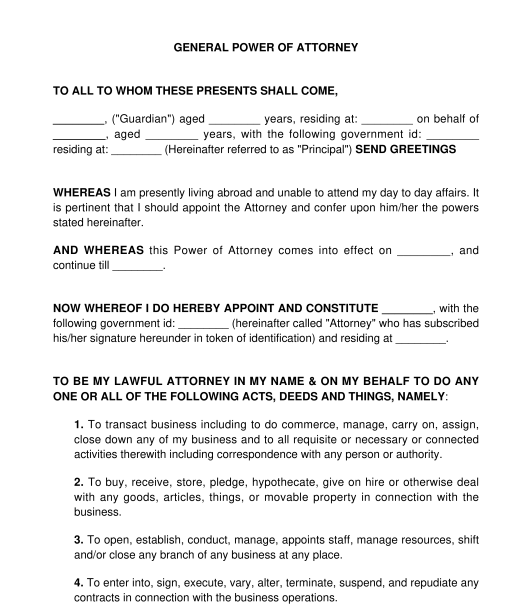 19-10-2025
19-10-2025

Answer a few questions and your document is created automatically.

Your document is ready! You will receive it in Word and PDF formats. You will be able to modify it.

 19-10-2025
19-10-2025
 Word and PDF
Word and PDF
 5 to 8 pages
5 to 8 pages
The General Power of Attorney is a document used by a person ("Principal") to plan their future and decide who will make decisions on their behalf to manage their affairs in their absence or inability to act. A Power of Attorney is most frequently used in the event of a Principal's temporary or permanent illness or disability or when the Principal is unable to be present to sign necessary documents or do necessary acts.
A General Power of Attorney for Property grants the attorney the authority, at the principal's discretion, to manage the principal's properties. This includes activities such as buying and selling real estate, property development, and obtaining necessary licenses and permissions. On the other hand, a General Power of Attorney is used for delegating authority related to other general purposes including banking transactions, legal representations, business formations, etc.
A will come into effect only after the death of the testator or maker of the will. It mainly focuses on how the assets and belongings of the testator will be distributed and who will take care of their dependents after death. Power of Attorney is effective during the lifetime of the principal when the principal is unable to take care of things due to health issues or other factors.
No, it is not mandatory. However, it is better if someone anticipates being unavailable to manage their affairs. Having a written General Power of Attorney helps both the principal and attorney to be on the same page. The document can be used as proof of authority for the attorney to act on behalf of the principal even before courts and tribunals.
The principal is the person who grants the authority to manage the affairs mentioned in the General Power of Attorney on behalf of the principal.
The attorney is the person or entity who is authorized to act on behalf of the principal. The attorney is obligated to work on behalf of the principal as per the General Power of Attorney document.
The attorney cannot be granted any rights the principal does not have or which is illegal including fraudulent activities, forging documents, etc.
The power of Attorney can be used by any individual above the age of 18 years and who is competent to enter into a contract. In the case of a minor, only the guardian of such minor can enter into a Power of Attorney.
The Attorney can be either an individual or an entity. Any person/entity eligible to enter into a contract can be an Attorney. There is no limit to the number of attorneys appointed under a Power of Attorney.
The Power of Attorney can be created for an indefinite period and continue even if the Principal is unable to make decisions due to mental or physical incapacity or for a period till the Principal is unable to make decisions due to mental or physical incapacity or for a fixed period mentioned under the Power of Attorney itself.
The Power of attorney will be legally binding when it is printed on non-judicial stamp paper or e-stamp paper and signed by each party and has been dated. The value of the stamp paper would depend on the state in which it is executed. Each state in India has provisions in respect of the amount of stamp duty payable on a power of attorney. Information regarding the stamp duty payable can be found on the State government websites.
No, however, notarization adds the authenticity of a General Power of Attorney and some institutions example banks require the notarization to accept the document. In case the Principal is located in India, the Power of Attorney needs to be Notarized in India and in case the person living abroad the document needs to be executed before the respective embassy officer of that particular country.
Yes, most institutes require two witnesses to accept a Power of Attorney. The witnesses must be above the age of 18 years and parties not related to the General Power of Attorney.
Yes. The Power of Attorney gets revoked in the case of:
Usually, the Principal issues the Power of Attorney during the period of his/her lifetime. But the Principal can specifically mention in the Power of Attorney if the document exists beyond the death, cannot make decisions due to mental or physical incapacity, or bankruptcy of the Principal.
Even the irrevocable Power of Attorney can be revoked in certain situations like the Attorney's incapacity to do the duties under the document, the Attorney not acting in the best interest of the Principal and so on.
The following are some of the authorities that are often granted under a General Power of Attorney:
The General Power of Attorney covers the following major areas:
The general rules of the Powers of Attorney Act, 1882 and the Indian Contract Act, 1872 will be applicable here.
You fill out a form. The document is created before your eyes as you respond to the questions.
At the end, you receive it in Word and PDF formats. You can modify it and reuse it.
Guides to help you
General Power of Attorney - Template - Word & PDF
Country: India